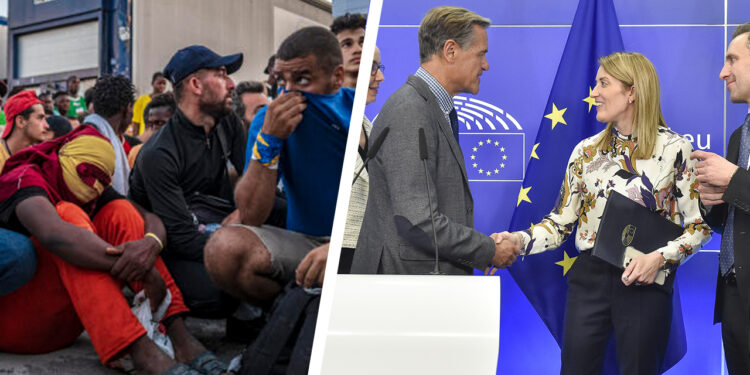Recent reforms agreed by the European Union (EU) on the Migration and Asylum Pact will seriously erode the rights of asylum seekers’ and increase human suffering, according to human rights organisations.
A political agreement reached by the European Commission, the EU Council and the European Parliament on Wednesday is set to overhaul the EU’s migration and asylum policies through a series of rules governing member states’ responses to arrivals.
The pact, which has been heavily criticised by human rights groups, allows countries to opt out of key asylum rules during periods of increased arrivals or in cases of ‘instrumentalisation’ of migrants, potentially breaching international obligations. Under the new system, irregular arrivals, including those rescued at sea, could face detention and substandard asylum procedures, with children as young as six being fingerprinted.
The European Council on Exiles and Refugees, a coalition of migrant rights non-governmental organisations, criticised the changes as complex and cruel, describing them as, ‘Byzantine in their complexity and Orban-esque in their cruelty.’
Amnesty International issued a stark warning, highlighting several aspects of the deal that could negatively impact people on the move, from their treatment by countries outside the EU to their access to asylum and legal assistance at Europe’s borders.
“This agreement will set back European asylum law for decades to come. Its likely outcome is a surge in suffering on every step of a person’s journey to seek asylum in the EU,” said Amnesty International’s Director of European Institutions, Eve Geddie.
According to Geddie, the pact is designed to make it harder for people to access safety, with potential consequences including increased de facto detention at EU borders, reduced safeguards for asylum seekers, and a shift towards substandard border asylum procedures rather than fair and full assessments of asylum claims.
Human Rights Watch (HRW) also rejected the reforms, calling them ineffective and abusive. The move brings the EU closer to legalising the denial of asylum, the watchdog argued.
Rights groups pointed out that the deal fails to address issues of cooperation between EU member states in processing asylum seekers and increases the EU’s dependence on external states such as Albania, Libya, Tunisia and Turkey to manage migration. The option for states to pay for reinforced external borders or to fund countries outside the EU to prevent people from reaching Europe was particularly criticised.
Despite the triumphant rhetoric surrounding the new pact, human rights groups cautioned against celebration, stressing the need for a fair, humane and rights-based approach.
Talks on the pact will continue at a technical level until February 2024, with formal adoption expected before the European Parliament elections in June 2024.










